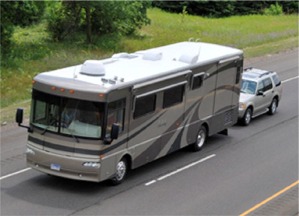
Traveling in an RV can be one of the best ways to bond with your family members and experience the country. It's not just about getting from one place to another, it's also about exploring new places along the way. While the RV is a great way to get to your destination, sometimes you need a smaller, more agile vehicle to get around once you've arrived. Dinghy or flat towing is one of the most common ways to take a second vehicle along for the trip. Here are a few things that RV owners should know about dingy towing before they head out on the road.
Not all Vehicles can be Towed
Although many passenger cars and light trucks can be dinghy towed safely, doing so could have an effect on the vehicle's warranty. Motor Home Magazine puts out a Dinghy Towing Guide each year that details the newest vehicle models that can be dinghy towed. It can be a great resource for RV owners to reference. If you are unsure whether your vehicle can be towed in this way, check the owner's manual or contact the manufacturer.
Weight Limits
Before you hook up and drive off with a vehicle in tow, you must make sure that your RV is capable of handling the load. Check your owner's manual to find out the maximum towing limit of your coach and compare it to the vehicle you intend to tow. This is only one part of the equation, however. The tow limit for the hitch receiver must also be capable of handling the load you intend to haul. Although you can upgrade to a higher capacity hitch receiver, it will not increase the overall towing limit of your RV.
Braking Requirements
With the added weight of a towed vehicle, the braking system of your RV may not be adequate. For this reason, most states require that an auxiliary braking system be installed between the two vehicles. In the event that you were to have an accident and you didn't have one in place, you could face legal consequences. Since each state has its own requirements, you should familiarize yourself with the towing laws of each state you'll be traveling through.
When it comes to safe dinghy towing, the most important thing to keep in mind is whether or not the vehicle is rated to be towed in this manner. For everyone's safety, check the owner's manual of both the RV and the dinghy, making sure that they are compatible before you hook up and drive off. If you have any questions at all regarding dinghy towing or towing supplies such as braking systems, base plates or tow bars, please
contact us. We'll be more than happy to help you.
By Julie T
Dinghy Towing Tips to Keep in Mind
|